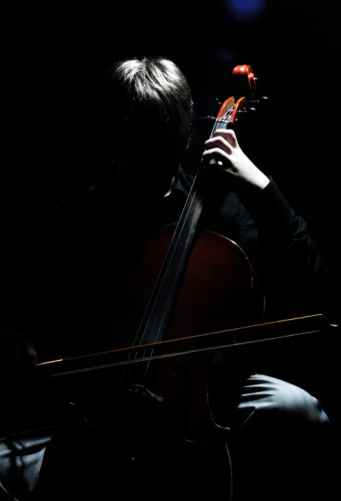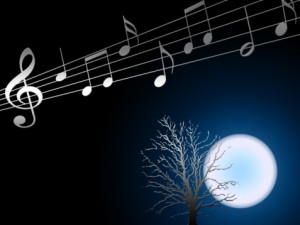Night Music
By Asher Crispe: March 15, 2012: Category Inspirations, Simple Rhythms
 I have always been nocturnal. There is something about the intensity of the silence of the late hour that enriches any sound that is staged upon it. In my mind, this is the best time to enjoy music. I seem to hear it with new ears. It is more meditative, more emotional. Composers, such as Chopin who wrote nocturnes, seem to have been commissioned by the spirit of the night. The time has its own demands and requires a composition which is more intimate, more nostalgic, more personal.
I have always been nocturnal. There is something about the intensity of the silence of the late hour that enriches any sound that is staged upon it. In my mind, this is the best time to enjoy music. I seem to hear it with new ears. It is more meditative, more emotional. Composers, such as Chopin who wrote nocturnes, seem to have been commissioned by the spirit of the night. The time has its own demands and requires a composition which is more intimate, more nostalgic, more personal.
Night music can be the music of yearning, an exploration of our unconscious, a search for a lost connection. In all of history, there is no one so famous for his pining spirit taken aloft in song during the darkest moments of the night than Kind David. Talmudic tradition relates how he would hang a harp above his bed. Then, in the middle of the night, a northern wind would blow upon it causing him to wake up and study Torah and sing praises to the Creator.
King David would detail the meaning of night music in the following line from the book of Psalms (77:7):
“I recall my music in the night; in my heart I meditate, and my spirit searches.”
What does it mean to “recall my music in the night”? Why is it “my” music and why “in the night”?
Rashi, the rabbinic commentator par excellence, explains the verse as a reference to a time of exile when the Temple in Jerusalem is destroyed. Expanding upon this, we might consider that general brokenness of the world. The longing is for restored unity, a time when the entire world works as an ensemble, when our collaborative efforts are orchestrated like a song. The melody prefigures beauty and flow. Everything heard in the right mixture and proportion commands our admiration. We ourselves are the notes and tones. Yet, somehow this has been forgotten to the world and the only remaining trace of it is the hopeful memory that can be triggered from out of the depths of the soul with the right musical cue.
Midrashic literature has established a comparison between night and exile. Here, the exilic theme does not only imply the historic geopolitical displacement of the Jewish people, but also attests to the universal human condition, the existential experience of uprootedness, the pervasive sense of being out of joint. The night is the time of uncertainly, of ambiguity, of doubt. It is a time when a person cannot get his or her proper bearing. The night obfuscates one’s true relationship with the world all around.
As such, the kabbalists spin the day and night into the metaphor for consciousness cycling through its various phases. Night, as the great symbol of the unconscious—the domain of forgetting—ushers in the diurnal awaking. Consequently, to remember ‘my music in the night’ constitutes an uncovering of the unique soul melodies possessed by every individual. Perhaps every entity in Creation has nothing more to show for its existence than a song. We are the music. We always have been, but we require the distractions of the world to subside long enough to locate our musical reality within.
There are many forms of Jewish meditation. The next part of the verse establishes music as one of them. Meditating in one’s heart could be retranslated as conversing with one’s heart. The word ashicha in Hebrew implies speech. Thus, the idiom is about clarifying one’s emotions and allowing them to expressive themselves. The phrase: “my spirit searches” may alternatively be read as “I search for my spirit,” for that which animates me, drives me, soliciting my inner self. We might add that ruach (spirit) in the original also alludes to the idea of direction in the sense of the four spiritual (ruchot) winds that course across the globe. Hence, repossessing one’s spirit is tantamount to realizing one’s direction in life.
Since this verse has three distinct parts in the original Hebrew, it is important to point out that they maintain sufficient syntactic ambiguity so as to permit multiple readings of their causal order.
Interpreting the phrases in a linear fashion we find that the memory of one’s true soul music can be a catalyst for a heart to heart with one’s own emotions and thus sets a person off in pursuit of one’s true self. We have the music and it in turn triggers the meditative search for the missing essence of self. A to B to C.
However, another equally valid possibility entails meditation as the ticket to a personal odyssey that will uncover the lost music of one’s soul. The absence is one of song rather than self. I am always already here, but buried inside of me the memory of the melody that bridges the dreams of the past to the dreams of the future. B to C to A.
 A third encoding might entail a journey of the self as the kindling of an internal conversation out of which arises the distinct markings of one’s fluid psychodynamics, the tonality of one’s character. C to B to A.
A third encoding might entail a journey of the self as the kindling of an internal conversation out of which arises the distinct markings of one’s fluid psychodynamics, the tonality of one’s character. C to B to A.
Regardless of the combinatorics, the knotting together of music, meditation and self-discovery converge in the opacity of the unconscious. We wait for the right sounds to stir us. They are momentarily lost in the rattle and hum of the day but shimmer and enter our range of hearing at night. Listen.
Night Music,

















;)
;)
;)
;)
;)
;)
;)
;)
;)
;)

A beautiful piece on meditation and the power of music. Very thoughtful.
Many thanks!!